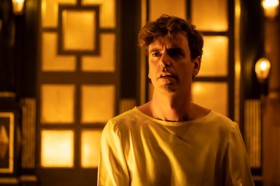Review: AFTER EDWARD, Sam Wanamaker Playhouse

![]() During the latter part of this winter season, Shakespeare's Globe has been concentrating on Voices in the Dark: Pride, Then and Now, with a production of Marlowe's infamous Edward II running alongside a range of different events. The latest is a piece of new writing from Tom Stuart, which is a response to the Marlowe play; Stuart takes on the role of Edward in both productions.
During the latter part of this winter season, Shakespeare's Globe has been concentrating on Voices in the Dark: Pride, Then and Now, with a production of Marlowe's infamous Edward II running alongside a range of different events. The latest is a piece of new writing from Tom Stuart, which is a response to the Marlowe play; Stuart takes on the role of Edward in both productions.
As you enter the Sam Wanamaker Playhouse, the usual warm glow of the candles is not there - instead you are plunged straight into darkness as you wait for the play to begin. Not long after this, someone else is plunged in: Edward falls to the floor and is given a rude awakening by the Archbishop of Canterbury, who does at least provide the puzzled man with some light before leaving.
Things only get more bemusing for Edward when he is joined by Gertrude Stein (travelling by toilet), Quentin Crisp (suspended on a swing), and Harvey Milk (with a megaphone, in full flow). What could they possibly be there for? And how do they seem to know his thoughts?
It's clear from the outset that this play has been written specifically for this theatre, and by a man who's very familiar with the performance space; whilst other theatres could feasibly fit themselves around it (and I'd argue that this should happen, to get the play to a wider audience), every little detail here is a perfect fit. Stuart's writing acknowledges the space, and Brendan O'Hea is daring in his direction; actors enter and exit through the audience in various different ways, making it clear that we are part of the story too.
A key thread that weaves its way through the play is the change in perception of homosexuality, as well as the progress of society in accepting people's individuality. After Edward couldn't have come at a more apt time, with the recent row over a Birmingham primary school cutting LGBT lessons and the confirmation this morning that Brunei will bring in death by stoning as a punishment for gay sex from next week - both of which are seamlessly referenced. The different opinions from Stein, Crisp and Milk serve as a sounding board for Edward as he tries to work out what drew him there and what it is that he needs to face up to.
The play is also a great study of an actor's process; we step into the mind of a creative and see how deep they are prepared to go in order to become their character - later guest Edward Alleyn sees his job as speaking the words for money and nothing more, as opposed to the opportunity for modern-day actors to do in-depth research, dig into the psychology, or potentially find a personal connection with their character. In this way it's also a very personal piece from Tom Stuart, with insights from the preparation for both this play and Edward II feeding into construction and performance.
It's a great shame that this intelligent and witty play was only given eight performances across a couple of weeks - obviously a lot of people come to this theatre for Shakespeare and his fellows, and new work brings its own risks, but given the popularity of original pieces over the past few years at Shakespeare's Globe you'd hope this would translate into slightly longer runs (or at least some more flexibility to extend).
There's currently no more new writing scheduled at the Globe, which is a great shame, and it's unclear as to when their new 'scriptorium' project might end up with something being performed, so we might have to wait a while for another gem like this to appear on either stage.
As well as the quality of the writing, there are also some fine performances on show. Annette Badland is queen of the withering stare, and brings her natural comic talents to her portrayal of Gertrude Stein; Badland also manages to break your heart as the quiet realisation dawns that Alice won't be joining her there. Richard Cant is superbly flamboyant as the dangling Quentin Crisp, and Polly Frame gives a passionate performance as the American politician Harvey Milk.
Sanchia McCormack's fleeting appearances as Margaret Thatcher are definitely unexpected, and leave a lasting impression. Seyi Andes-Pelumi comes close to stealing the show as young bully Errol managing some quite complex sentences with more aplomb than most adults could! He also has a terrific delivery, and is certainly one to look out for.
Tom Stuart himself is incredibly funny - both in Edward's bewilderment at his surroundings and his interactions with the icons who join him - but also bares his soul and presents a character that so many can relate to.
With the sound of the Pet Shop Boys' "Liberation" ringing in your ears (a cappella, courtesy of The Fourth Choir) and the sight of the cast bopping away onstage, it's impossible to leave the theatre not feeling uplifted. There may still be a way to go to achieve true equality, but After Edward is a great reminder of how far we've come - and that we should take pride in our individuality.
After Edward is at the Sam Wanamaker Playhouse until 6 April
Picture credit: Marc Brenner
Reader Reviews

Videos
